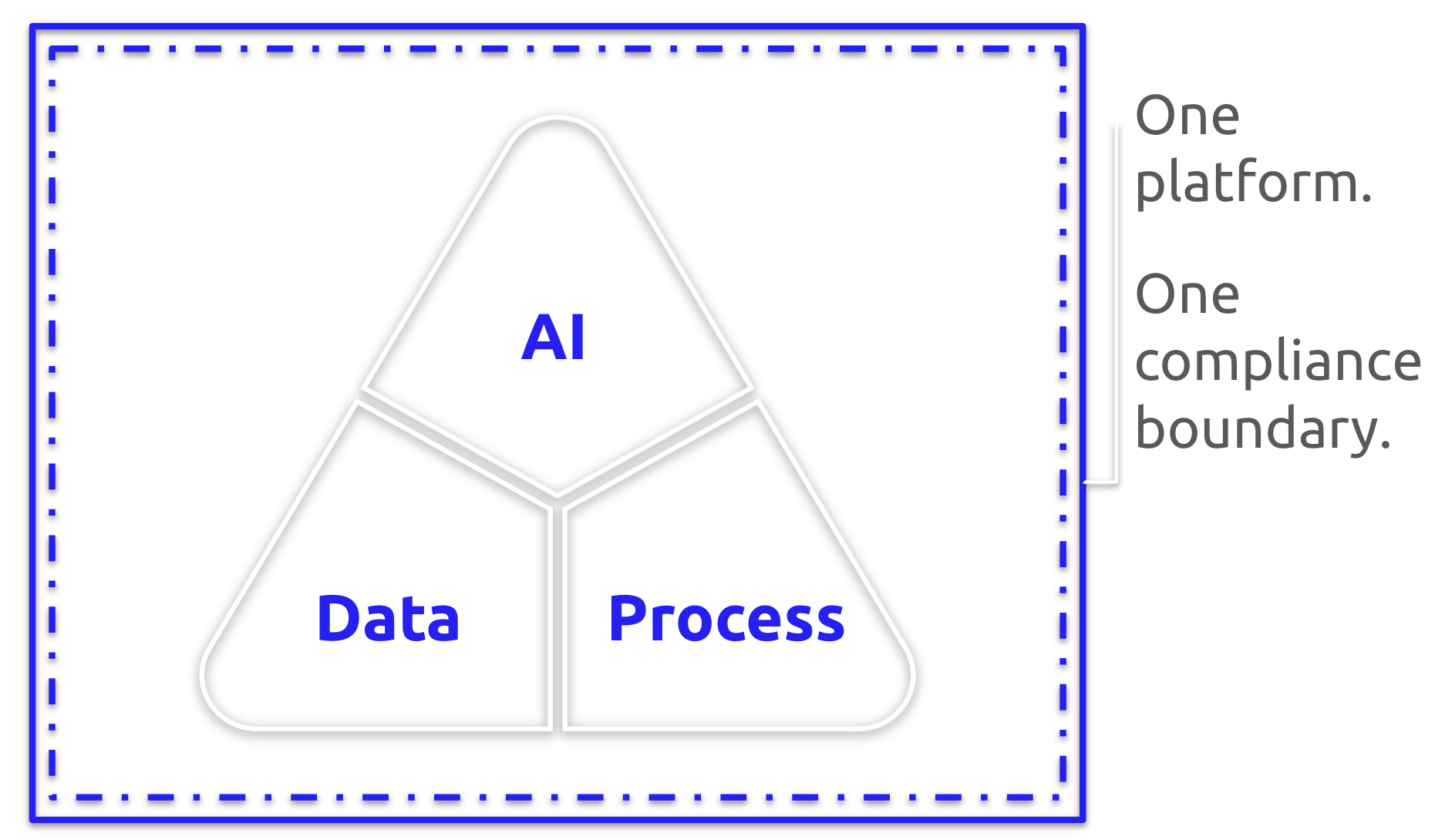OverviewCopy link to clipboard
Artificial intelligence (AI) and machine learning (ML) can revolutionize how you do business. But with data as the foundation, AI and ML are exciting prospects that must be carefully planned, implemented, and used: especially if you plan to use AI with proprietary or protected information.
This page describes private AI: Appian's approach to protecting your data during model creation, training, and use. You'll find details on private AI's advantages over public AI tools, and how we build features with private AI in mind.
With Appian's private AI, we:
- Never share your data outside of the Appian Cloud compliance boundary.
- Never train our own models on your data, or share your models with other customers.
- Ensure data always remains in your control.

Jump to the list of Appian private AI features to get started building secure AI-powered applications.
Public AI vs. Private AICopy link to clipboard
Appian wants you to embrace AI knowing that your data is protected during every step of design, implementation, and use. The best and most secure way to integrate AI into your processes is through private AI.
Learn more about private AI's advantages over public AI:
| Private AI | Public AI | |
|---|---|---|
| Data sharing | Your data is never shared outside of Appian's Cloud compliance boundary. | Your data is in the hands of the public AI model owners, and may be used at their discretion. |
| Model training and sharing | Your data is only used to train your models and those models are never shared. | Your data may be used to train other models, including those for competitors. |
| Data control | Your data always remains within your control. | Once your data is shared, you can't always know how it will be used or who will see it. |
Private AI feature matrixCopy link to clipboard
| Feature | Private AI? | Additional details | ||||||
|---|---|---|---|---|---|---|---|---|
| AI Skills | ||||||||
| Prompt builder AI skill and generative AI skills | Yes. | Prompt and input text never leave Appian's security boundaries. | ||||||
| Document extraction AI skill | Yes. | Build and train your own model using your own sample documents. Custom models are tailor-made for your business to provide higher accuracy. | ||||||
| Document classification AI skill | Yes. | Build and train your own model using your own sample documents. Custom models are tailor-made for your business to provide higher accuracy. | ||||||
| Email classification AI skill | Yes. | Build and train your own model using your own sample emails. Custom models are tailor-made for your business to provide higher accuracy. | ||||||
| Sentiment analysis | Yes. | |||||||
| AI Copilot for Business Users | ||||||||
| Records chat component | Yes. | This component returns data according to record-level security you have configured. We don't give models any information the user does not have permission to access. The component never has the opportunity to share information the user shouldn't have access to. | ||||||
| Chat in data fabric insights | Varies. |
Each dataset inherits the record type object security and record-level security configured on the record type and its related record types. AI Copilot responses only reference the data that the user has access to. Appian does not share or reuse data or models utilized by this feature.
|
||||||
| Enterprise Copilot | Yes. | Files and conversations never leave Appian's security boundaries. | ||||||
| AI Copilot for Developers | ||||||||
| Generate interface from PDF | No. | Leverages Microsoft Azure OpenAI service. Azure OpenAI doesn't use customer data to retrain models. For more information, see the Azure OpenAI data, privacy, and security guide.
Appian does not share or reuse data or models utilized by this feature. |
||||||
| Process model node recommendations | Yes. | |||||||
| Create sample data for record types | Yes. | Develop and test your applications faster by automatically creating realistic record data suitable for effective demos and in-depth testing. | ||||||
| Generate test cases for expression rules | Yes. | Appian AI Copilot helps to elevate your expression rule testing using AI-driven test cases. Perfect for unit testing, this capability not only suggests scenarios to consider but also saves you time by automatically generating basic test cases. | ||||||
